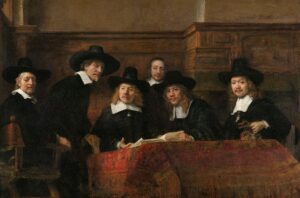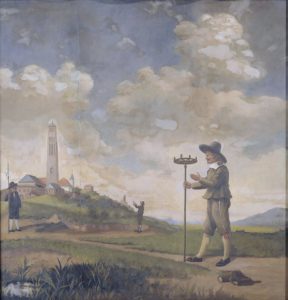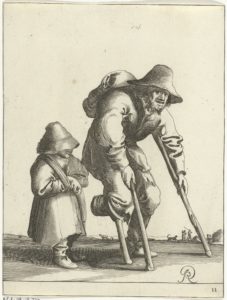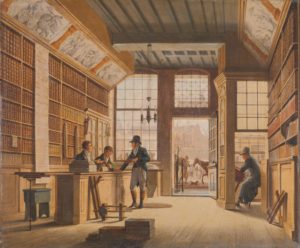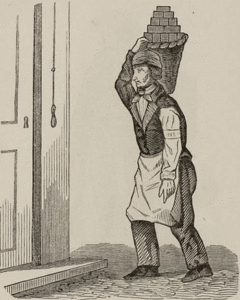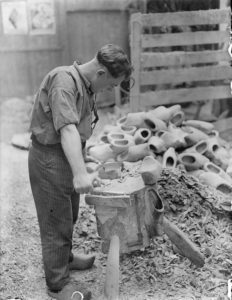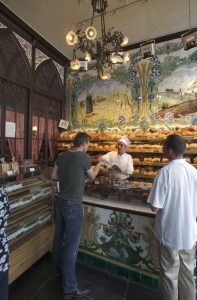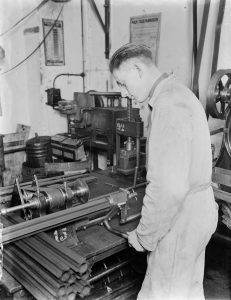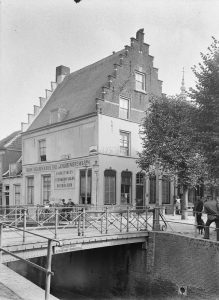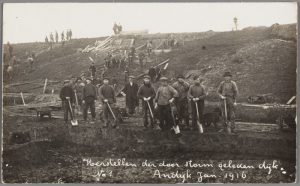The beroep is the occupation of your ancestors. Knowing the beroep not only gives you some insights into your ancestors lives, but can help you in your research since different occupations created different types of records. See the article How to Find your Dutch Ancestor's Occupation for more information. … [Read more...]
Dutch term – Landmeter
A landmeter is a surveyor. Landmeters were not only called in to record new borders, but also when there was a dispute about borders or property ownership. Their records can often be found in town records or in the court records. … [Read more...]
Dutch term – Armenjager
An armenjager is a poor hunter, an official charged with driving away beggars. By the end of the 1600s, poor economic conditions caused many people to turn to begging. Churches and towns provided for their own people, but strangers had no choice but to beg. To prevent these strangers from taking charity that could be used by the towns' own folks, some towns hired an armenjager to get rid of them. They were usually put across the border of the municipality or province to make them somebody … [Read more...]
Dutch term – Boekhandelaar
A boekhandelaar is a book trader or bookstore owner. Until recent times, a large part of the population was illiterate and book traders could only be found in larger cities. Many book traders were also publishers. Estate inventories in notarial records can show us if our ancestors owned any books, sometimes including the titles. … [Read more...]
Dutch term – Turfdrager
A turfdrager was a peat carrier. Peat was an important fuel, both for private homes and for businesses like breweries and bakeries. An abstract of the instructions for the peat carriers in Leeuwarden from 1660 gives an impression of the regulations that a peat carrier was expected to live by. Articles that regulate the peat carriers of this city Nobody will be admitted as peat carrier without the consent and approbation of the magistrate of the city. Peat carriers are required … [Read more...]
Dutch term – Klompenmaker
A klompenmaker is a wooden shoe maker. For many people in the Netherlands, wooden shoes were the common footwear. Wooden shoes were sturdy, protected toes when something fell on it, and made from material that's easily available. And if they broke beyond mending, you could always use them for firewood! Nowadays, some farmers still wear wooden shoes because they're practical. They're also part of traditional costumes. … [Read more...]
Dutch term – Bakker and Bakkerij
A bakker is a baker, and a bakkerij is a bakery. Bread was and is a staple in the Dutch diet. The content and weight of loaves of bread was heavily regulated. If you have ancestors who were bakers, you may find them on lists of calibrated weights, or involved in court cases if their loaves were found to be too light or containing different ingredients than advertized. … [Read more...]
Dutch term – Arbeider
An arbeider is a laborer. Sometimes, records will indicate the type of work they did, such as a boerenarbeider [farm laborer] or fabrieksarbeider [factory worker]. Most laborers were poor and did not own any real estate. Many were illiterate. … [Read more...]
Dutch term – Kruidenier
A kruidenier is a grocery (the shop) or grocer (the occupation). The word kruiden means spices, and reminds of the colonial origins of the word, when people would go to the kruidenier to buy pepper and nutmeg from the East Indies. Since the 1960s, most kruideniers have been replaced by supermarkets. … [Read more...]
Dutch term – Dijkwerker
A dijkwerker is a dike worker, somebody who creates and maintains dikes. In earlier times, people in a community that was protected by a dike would be required to help maintain the dike. Later, this was changed to a tax that paid professional dike workers to maintain the dikes. Taxes still pay for the upkeep of the dikes today. … [Read more...]
